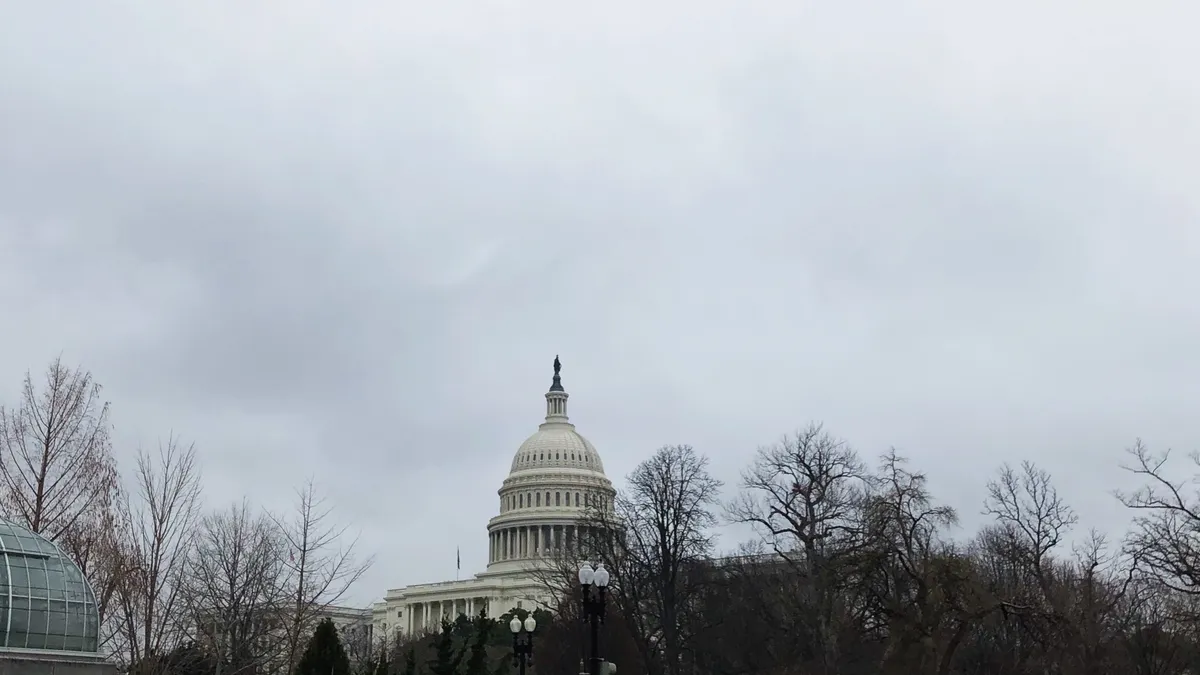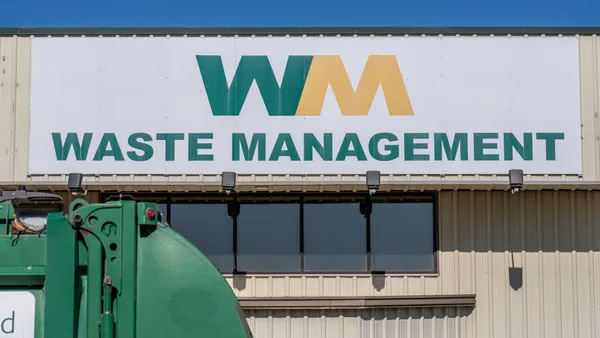UPDATE: March 27, 2020: President Donald Trump signed the more than $2 trillion stimulus package on Friday. The move came after the House of Representatives passed the relief legislation despite objections from Rep. Thomas Massie (R-Ky.), who sought to demand lawmakers vote in person. House leadership overcame Massie's efforts to demand a full roll-call vote and sent the aid package to Trump's desk.
Dive Brief:
- The Senate unanimously passed a $2 trillion stimulus package on Wednesday night, addressing widespread issues stemming from the new coronavirus. President Donald Trump has indicated his approval and the bill goes now to the House of Representatives, where lawmakers are under pressure to pass it swiftly.
- Despite waste collection largely being deemed an essential service during the pandemic, there is little in the way of direct aid to the industry in the relief proposal. Many workers will benefit, however, as the stimulus includes $1,200 checks to most U.S. adults based on income levels, as well as $500 per child. Loans through the Small Business Administration (SBA) will also boost smaller haulers and companies with 500 or fewer employees.
- The National Waste and Recycling Association (NWRA) called on Congress to pass the package "without delay." David Biderman, executive director for the Solid Waste Association of North America (SWANA), told Waste Dive the stimulus could be important for the industry and his conversations "with several haulers" indicated plans to apply for SBA loans.
Dive Insight:
Outside of direct payments to individuals, the stimulus allocates $367 billion in small business loans, with $250 billion put toward unemployment insurance benefits. Workers on unemployment would receive an extra $600 per week for four months, in addition to their current state benefits. Up to 13 weeks of extended benefits would also be added to current state totals.
Meanwhile, a $500 billion lending program is intended for impacted companies. Virtually all parts of the waste and recycling sector have been affected by COVID-19 in some way, but lawmakers have largely focused on industries that have directly sought emergency funding – like aviation, energy and cruise lines. That emphasis is reflected in the stimulus package, which allots $25 billion alone to passenger air carriers and more than an additional $20 billion to other specified sectors.
The remaining amount is available to businesses, municipalities and states, that can apply for the loans if they meet certain conditions, including retaining 90% employment levels as of March 24 through September 30 "to the extent practicable."
A March 22 Stifel report found the waste industry could see impacts that "will look like both 9/11 and the Great Recession." That includes notable hits to volumes from sources including C&D, special waste and third-party commercial. But residential volumes are expected to rise, and the report ultimately indicates business will endure.
So far, only one of the industry's public companies has publicly addressed financial impacts. A March 25 filing from Republic Services noted the difficulty of any predictions and offered those unknowns might "have a more significant adverse effect" on operations and finances. But the company also sounded an upbeat note about its "highly resilient business model."
Smaller haulers, by contrast, are facing many of the same constraints as other more localized businesses. Concerns about worker absenteeism due to illness remain ongoing, along with decreased waste volumes associated with the closure of many institutions and retail establishments.
"They are running very tight margins. Many of them, the family-run businesses, they are running month to month to keep the lights on, to keep the trucks running," Rubicon Global CEO Nate Morris told Waste Dive on Monday. "These are the Main Street, small businesses and they don’t have the luxury that some of the Wall Street-backed companies do that they compete against."
Biderman of SWANA emphasized the stimulus is important for those smaller players and individual workers. "Although we are not aware there is anything specific to the waste industry in the stimulus package, both solid waste employers and employees will benefit from it," he said, noting "virtually every front-line solid waste employee in the United States will receive these payments." SBA loans will also help small businesses and come with "very attractive rates to meet payroll and make up for declining revenue," he added.
Billy Johnson, chief lobbyist with the Institute of Scrap Recycling Industries (ISRI), told Waste Dive on Wednesday he was still reviewing the package, but indicated it could also prove beneficial to small scrap companies. NWRA's lobbyist, Jim Riley, was still reviewing the relief proposal when Waste Dive asked for comment on Wednesday. The organization later responded to the stimulus Wednesday afternoon, praising the package and pushing for passage. The inclusion of employee retention credits and modifications of limitation on business interest were highlighted.
The stimulus also addresses concerns over "bad debts" incurred when companies continue services without payment, an issue NWRA has previously raised as a concern for the industry. Modifications for net operating losses expanding both carryovers and carrybacks are among the provisions in the deal, the organization confirmed.
The House is expected to vote on the package Friday morning, at which point it would head to Trump for his signature.
With additional reporting by Cole Rosengren










